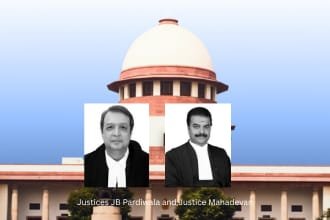In a significant development that could impact thousands of engineering aspirants across the country, the Delhi High Court has issued notice to the National Testing Agency (NTA) over allegations of discrepancies in the JEE (Main) 2025 examination. The petitioner, Shashank Shekhar Pandey, approached the Court alleging systemic lapses in the examination process, including a mismatch in the number of attempted questions recorded in his response sheet.
The matter was heard by Justice Vikas Mahajan, who not only sought the response of NTA but also passed interim directions that could set a precedent for future exam-related litigations.
Background of the Case
The Joint Entrance Examination (Main) 2025, conducted by the NTA, is a crucial gateway for admission to top engineering institutes in India, including the IITs and NITs. Every year, lakhs of students appear for the exam after years of preparation. Shashank Shekhar Pandey, the petitioner, claimed that while he had attempted 46 questions during the examination, the response sheet uploaded by the NTA reflected only 29 questions. This significant mismatch raised questions about the reliability and integrity of the examination process.
Petitioner’s Plea: “My Last Attempt, No Remedy Left”
During the hearing, Pandey’s counsel, Advocate Shivam Pandey, passionately argued that this was his final attempt at JEE. “I attempted 46 questions. Then, a response sheet came a few days later where it was stated that I attempted only 29 questions. It appears that they have jumbled these numbers. I am left with no remedy,” he submitted, emphasizing that the registration deadline for JEE Advanced was the very next day.
Pandey further informed the Court that he had secured 90 percentile in JEE (Main) 2024 and had been preparing rigorously for over four years.
Delhi High Court’s Interim Relief
Recognizing the urgency and gravity of the situation, Justice Vikas Mahajan issued interim directions aimed at safeguarding the petitioner’s interests:
- Directed the authorities to register the petitioner for JEE (Advanced) despite the discrepancies in his response sheet.
- Instructed that the petitioner’s results be submitted in a sealed cover and not be made public.
- Clarified that these directions are subject to the final outcome of the petition.
Justice Mahajan also remarked that audit logs must be examined to resolve the issue conclusively and scheduled the next hearing for July 25, 2025.
NTA’s Response: “No Human Interference”
The National Testing Agency defended its process by asserting that there was no scope for human interference in the examination system. It stated that the entire process—from conducting the examination to evaluation—was managed by the National Informatics Centre (NIC), a government body responsible for secure IT systems.
However, the Court remained unconvinced, noting that the matter could not be resolved without a detailed examination of audit logs and backend records.
Legal Representation and Next Steps
The petitioner was represented by a team of advocates including Shivam Pandey, Priyanshu Upadhyay, Shruti Pandey, and Abhinav Sharma. The bench has now asked NTA to submit relevant documents and logs for perusal in the next hearing.
With the next hearing listed on July 25, 2025, the Court’s decision could have far-reaching consequences not just for Pandey, but also for the credibility of national-level examinations.
Legal Significance of the Delhi High Court’s Order
This case brings forth multiple important legal and procedural questions:
- To what extent can a candidate rely on response sheets uploaded online as accurate records of performance?
- What accountability mechanisms exist within digital examination systems?
- Is there a legal obligation to conduct an independent audit when systemic lapses are alleged?
- How should courts balance urgency with procedural rigor in exam-related disputes?
Justice Mahajan’s direction to consider audit logs suggests a shift towards more technical scrutiny in such matters. It reflects the judiciary’s evolving role in digitally administered examinations.
Relevance for Future JEE Aspirants
This case highlights several critical takeaways for JEE aspirants:
- Always download and verify your response sheet as soon as it is available.
- In case of discrepancies, immediately raise objections and preserve all related documents.
- Understand that legal remedies, while available, are often time-sensitive and require prompt action.
- Transparency and auditability in online examinations remain a matter of public concern and policy reform.
Public Trust and Systemic Reforms
The credibility of competitive exams like JEE (Main) hinges on the trust of students and parents. Allegations of discrepancies, even if isolated, erode public confidence and call for stronger mechanisms of transparency and grievance redressal.
Experts have long advocated for:
- Independent third-party audits of examination systems.
- Grievance redressal portals with real-time tracking.
- Clearer guidelines on what constitutes a valid discrepancy and how it will be addressed.
As digital infrastructure becomes central to India’s education and examination systems, robust technological safeguards and legal accountability must go hand-in-hand.
Conclusion
The Delhi High Court’s intervention in the JEE (Main) 2025 dispute underscores the importance of judicial oversight in ensuring fairness in national-level competitive exams. By directing provisional registration for JEE Advanced and seeking audit logs, the Court has prioritized student rights while maintaining procedural discipline.
As the case progresses, it will be watched closely by students, educators, policymakers, and legal professionals alike. The outcome could shape how exam discrepancies are handled in the digital age and set benchmarks for transparency and accountability in high-stakes testing.


